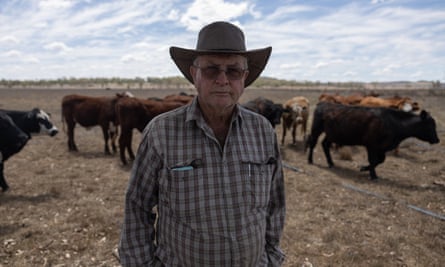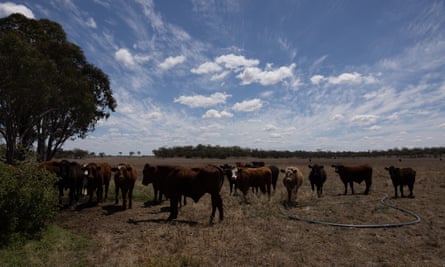Demand for emergency rural aid is rising as farmers face a dry and unproductive summer ahead.
The latest Australian agricultural seasonal outlook forecasts farm incomes will plummet by 41% on average this financial year.
The chief executive of Rural Aid, John Warlters, said requests to the national charity for mental health support, financial counselling and emergency livestock feed had “effectively doubled” in the last month.
“That’s absolutely a symptom of the rapid dry off,” Warlters said.
In June, Rural Aid made 27 emergency deliveries of drinking water to properties that rely on rainwater. Last month it made 147.
Australia is predicted to experience unusually high maximum temperatures and below average rainfall over summer, according to the Bureau of Meteorology’s seasonal outlook.
“There is this beautiful throwaway line that gets tossed around: ‘We’ve had two or three wet years so everyone in agriculture should be humming along again’,” Warlters said.
“There are certainly individuals who’ve done very well out of it … but what we see at Rural Aid is that it’s clearly not the case for everyone.”
On a property outside Toowoomba in southern Queensland, cattleman Sid Plant, 78, gazes at fields of brown grass in the bare midday sun.
“We are vulnerable,” Plant said. “We can’t sell cattle because they are not market ready.”
Plant said the area had not received “useful” rain since February, leaving him with barely enough grass for his cattle to continue gaining weight.

“We’ve just got to keep going and hope we don’t run out of feed and hope that there’s a market there when they are ready,” he said.
In June, Plant applied for a free water tank from Rural Aid to bulwark the property against future dry spells, which he received a few weeks ago.
“We don’t want to seem like we are accepting a free kick,” Plant said. “We were hoping to do it ourselves anyhow but it made it a whole lot easier for us.
“We really appreciate it, they are doing a damn good job.”
after newsletter promotion
Last month, the charity offered up another 50 free water tanks, though this time stock was exhausted in just four hours after almost 100 applications.
The recently declared El Niño climate pattern, collapse of livestock markets and rising farm debts are putting additional pressure on producers, although increasing land values are likely to offset some of the pain.
“I’ve been studying climate change ever since I got my pilot’s licence in 1966,” Plant said. “Here, rainfall decline each decade is real. There’s a lot of writing on the wall and we need to respond to it.”

Plant’s daughter is beginning to take over the farm’s operations and one of his teenage granddaughters has proclaimed that she wants to be a farmer too. “I’m trying to do all I can to help them while I’m here so they can survive,” he said.
The Department of Agriculture has recorded a “moderate rise” in applications for the Farm Household Allowance scheme that provides payments to farmers under financial stress.
Bob Musgrave, a rural financial counsellor in northern New South Wales, said the number of producers seeking assistance with destocking strategies as conditions worsen had risen sharply.
“I’ve been taking an inquiry every second day for the last month. Prior to that it was probably once a week, and towards the start of the year nothing at all,” Musgrave said.
“Droughts, floods, pestilence and disease, they’re generic issues that the primary producers face … but they’re getting more severe.”
Join the Rural Network group on Facebook to be part of the community
In Australia, support is available at Beyond Blue on 1300 22 4636, Lifeline on 13 11 14, and at MensLine on 1300 789 978. In the UK, the charity Mind is available on 0300 123 3393 and Childline on 0800 1111. In the US, call or text Mental Health America at 988 or chat 988lifeline.org
